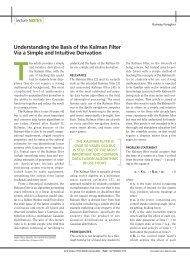December 11-16 2016 Osaka Japan
W16-46
W16-46
Create successful ePaper yourself
Turn your PDF publications into a flip-book with our unique Google optimized e-Paper software.
Preface<br />
Many Asian countries are rapidly growing these days and the importance of communicating and<br />
exchanging the information with these countries has intensified. To satisfy the demand for<br />
communication among these countries, machine translation technology is essential.<br />
Machine translation technology has rapidly evolved recently and it is seeing practical use especially<br />
between European languages. However, the translation quality of Asian languages is not that high<br />
compared to that of European languages, and machine translation technology for these languages has not<br />
reached a stage of proliferation yet. This is not only due to the lack of the language resources for Asian<br />
languages but also due to the lack of techniques to correctly transfer the meaning of sentences from/to<br />
Asian languages. Consequently, a place for gathering and sharing the resources and knowledge about<br />
Asian language translation is necessary to enhance machine translation research for Asian languages.<br />
The Workshop on Machine Translation (WMT), the world’s largest machine translation workshop,<br />
mainly targets on European languages and does not include Asian languages. The International<br />
Workshop on Spoken Language Translation (IWSLT) has spoken language translation tasks for some<br />
Asian languages using TED talk data, but these is no task for written language.<br />
The Workshop on Asian Translation (WAT) is an open machine translation evaluation campaign focusing<br />
on Asian languages. WAT gathers and shares the resources and knowledge of Asian language translation<br />
to understand the problems to be solved for the practical use of machine translation technologies among<br />
all Asian countries. WAT is unique in that it is an "open innovation platform": the test data is fixed and<br />
open, so participants can repeat evaluations on the same data and confirm changes in translation accuracy<br />
over time. WAT has no deadline for the automatic translation quality evaluation (continuous evaluation),<br />
so participants can submit translation results at any time.<br />
Following the success of the previous WAT workshops (WAT2014, WAT2015), WAT20<strong>16</strong> brings together<br />
machine translation researchers and users to try, evaluate, share and discuss brand-new ideas about<br />
machine translation. For the 3rd WAT, we proudly include new Asian languages: Hindi and Indonesian<br />
in addition to <strong>Japan</strong>ese, Chinese and Korean for the machine translation evaluation shared tasks. We had<br />
15 teams who submitted their translation results, and more than 500 submissions in total.<br />
In addition to the shared tasks, WAT20<strong>16</strong> also feature scientific papers on topics related to the machine<br />
translation, especially for Asian languages. The program committee accepted 7 papers that cover<br />
wide variety of topics such as neural machine translation, simultaneous interpretation, southeast Asian<br />
languages and so on.<br />
We are indebted to Hideto Kazawa (Google) who gave an invited talk. We are grateful to "SunFlare Co.,<br />
Ltd.", "TOIN Corporation", "Baobab, Inc". "Asia-Pacific Association for Machine Translation (AAMT)"<br />
and "PostEdit.Tokyo Co., Ltd." for partially sponsoring the workshop. We would like to thank all the<br />
authors who submitted papers. We express our deepest gratitude to the committee members for their<br />
timely reviews. We also thank the COLING 20<strong>16</strong> organizers for their help with administrative matters.<br />
WAT20<strong>16</strong> Organizers<br />
iii



